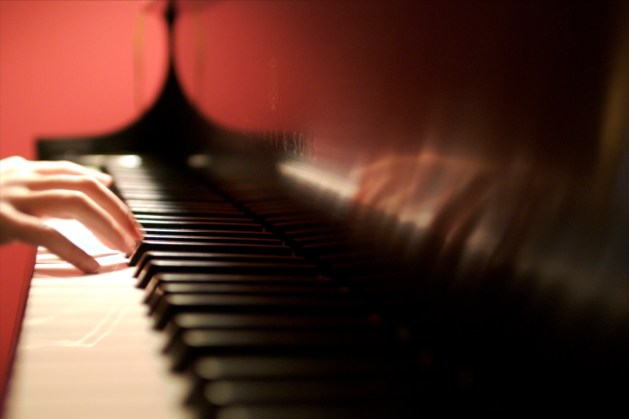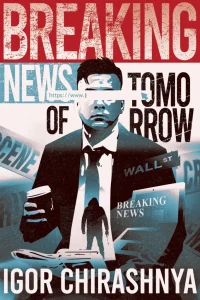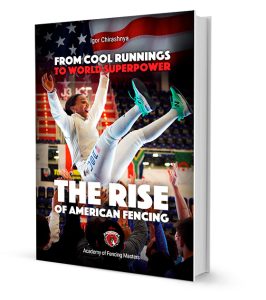
There’s a great misunderstanding about what fencing does for kids and where it should fall in their lives, both now and in the future. Not so much within the fencing community, but definitely with people who are looking at it from the outside.
With other activities, like music, for example, it’s perfectly acceptable for a child just to do the activity, and it is understood that simple enrichment is worthwhile. It doesn’t matter if they will become the best violinist or pianist who plays in Carnegie Hall. Parents understand that it’s enough for them to simply do this activity now. Even if they don’t play the piano into adulthood, it’s ok.
The discipline and creative thinking skills, not to mention the joy, are enough for everyone.
Yet, for some reason, fencing is not seen in this same light. Oftentimes, parents will come into the club to start their kids in the sport, and they’ll be laser-focused on how fencing’s biggest benefit is if their fencer goes all the way to the Olympics or at least gets recruited into a college. Anything short of these massive goals is not going to be enough.
It’s a frustrating situation, but one that I think we should explore. Not because music or other activities aren’t worthwhile, but because fencing is one that is just as worthwhile and which deserves to be seen in the same light.
Return on investment
The real crux here is that parents are sometimes looking to fencing to have a direct, immediate return on investment. Where no one would ever expect a year of piano lessons to result in mastery of the piano, for fencers, there can be this expectation that a child should immediately succeed.
Can a novice fencer do really well early on in their competitive career? Of course, they can. Every child is different, and every child deserves the opportunity to succeed. As someone who has been doing this for many years, I can tell you that the trajectory of development for fencers is very similar on the whole. The ones who make it to the top are those who stick with it and give in to their passion for it. There is no magic talent that your child can have which will make them a success from the very beginning.
Should it even be about that? This is the question that I want parents to ask themselves.
Chasing short-term victories and looking to medals as a tangible return on the investment of time and money into fencing is not a healthy way of thinking. It puts a huge amount of pressure not only on the coaches but, more importantly, it puts an unfair weight on kids.
Not every kid is going to grow up to write symphonies or record a hit song. Not every fencer is going to be an international champion or an Olympian. The return on the investment in the sport or in learning music does not come from getting to that high level, though we can of course hope that our kids will get there. If we put all of the emphasis on the outcome, the return on our investment of money and time as quantified by medals or placements, then we’re missing what the real return on investment is – personal growth and long-term positive qualities that will help our kids be happy and successful in the long term.
Kids are not vending machines where we put in dollar bills and get out champions or artists from the fencing or music branded box. The value doesn’t come from the trophies we can put on the wall.
Competitive vs. enriching
When you go to a child’s piano recital and they make tons of mistakes, do you go up to them afterwards and tell them “You were terrible, I could hear all of the wrong notes.” Of course not! No one would agree that good parenting is pointing out the mistakes when a child has been brave enough to get up in front of lots of people and put their musicality on display. You would tell them how much they grew and how proud you are of them.
After a fencing match where a child loses, and let’s note here that 50% of everyone who fences in a fencing bout is going to lose, it is somehow acceptable to go up to the child and say “You could have gotten this point and that point and then you would have won the match.” Why is this ok and accepted when the other in music is not? Both fencing and music involve getting up in front of lots of people and performing a skill that the child has practiced long and hard, putting lots of hours as well as emotion into becoming better.
Now, to be fair, there is an element of fencing being an inherently competitive venture where music is not.
We understand that music isn’t about winning or losing – it’s about the joy, self-satisfaction, and personal growth that comes with learning to play an instrument. A child playing the piano is going to find that they can do things that they did not imagine they would be able to do, and that’s a beautiful thing.
While much of music education does indeed involve competition, as in who will be first-chair violin versus second-chair violin in the band, there is always a sense that music is an art form that is somewhat beyond these placements. In other words, the notion of competing against another violinist is a thing layered on top of it, not that it’s really a part of being a violinist.
Fencing, on the other hand, does have an inherent sense of competition embedded in it. You cannot fence by yourself, even though you could play any instrument by yourself. One of the beautiful things about our sport is that it requires camaraderie through the shared experience.
However, if we can see the ways that competition can push musicians to be better and to grow, even though we don’t necessarily attach a definite end to them, then can’t we see how flipping the script and embracing fencing in the non-competitive ways that it enriches kids is also incredibly valuable? If you choose any art form, from ballet to singing to design to, of course, music, you will find there are competitions that you can enter your child in that will rank them and rate them based on their skill and development.
Both can be competitive. Both can be enriching.
In fact, as someone who has dedicated their life to fencing, I would say that the enriching nature of fencing is even more important than the competitive angle. The difference is that competition is an integral part of the process, which makes it easy to confuse competition as being the most valuable piece of the process.
What we get from each
When a child learn to play an instrument, they’re stepping into an area of their lives where they’ll learn discipline, routine, patience, and how to learn from a mentor. These are skills that will help them not only while they’re learning to play the instrument itself, but that they will also use for their whole lives.
Most people who learn to play an instrument in childhood don’t keep up with it into college, much less when they go into adulthood. They let go of this activity and go on to do lots of other things as their tastes change and their time and energy are needed elsewhere. Yet still, we almost universally understand that the time and effort put into that journey of music will live with them throughout their whole lives.
Fencing, like playing an instrument, isn’t just a physical endeavor. It’s a mental challenge that necessitates strategic thinking, quick decision-making, and adaptability. The cognitive and physical harmony comes through in dexterity and critical thinking skills in both. Though we tend to think of sports as physical disciplines, music is very much a physical activity as well. The nuanced movement of fingers for a pianist or a drummer is something that involves training muscles to react in specific ways, and it takes time. Though fencing has comparatively much larger movements, they are both similar in their use of movement in this way.
In both music and fencing, resilience is key. Setbacks and challenges are part of the journey, and the ability to bounce back from defeats and keep pushing forward is a skill that serves kids as they grow older in their personal and professional lives. If we want our kids to be resilient, we have to support them when they make mistakes. They take their cues from adults, and the adults have to show them that it’s worthwhile for them to do their activities and try their best, regardless of the result.
Just as mastering a musical instrument requires discipline, fencing requires kids to show up and work hard over years of practice and training to become adept. The ability to set goals, work diligently towards them, and understand that success just takes time, but in that time they’re also growing. Even if they don’t become masters of whatever it is they’re doing, they’re still participating in something fantastic that will serve them throughout their lives.
Music is life-changing – as is fencing
It’s essential for children to be supported to embrace fencing just as they are supported to embrace music, even if they don’t continue with it through their adult lives or go on to become the top in the world.
The joy of participation and the friendships formed within the fencing community are invaluable, and the artistic inspiration and engagement from music can be invaluable as well. Though the performance of each might not be something that kids will be doing at a high level when they’re adults, the lessons learned and the love of the activity often last a lifetime.
Music is not about becoming the next Beethoven or Yo Yo Ma, and fencing is not just about winning medals or becoming the next Olympic champion. It’s a journey of personal growth, discipline, and lifelong enrichment. So, just as we encourage children to pick up musical instruments without the expectation of becoming virtuosos, let’s embrace fencing with the same spirit.
Allow your child to explore fencing for the love of the sport, without the burden of being successful right out of the gate. Give them the space to learn, grow, and discover the joy of just doing an activity. Fencing, like music, offers a symphony of lifelong benefits, giving kids the scaffolding they need to become well-rounded, disciplined, and resilient people who are ready to face the world, no matter the path they choose.




This blog particularly resonated with me as vocalist and musician. Having a opera mezzo grandmother meant I grew up hearing classical and put on that path. Despite early vocal- and instrumental-lessons, I had neither a unique talent or passion to pursue these, yet I performed both scholastically and later, semi-professionally, so that early training reaped life-long benefit. Similarly, my early fencing did not foretell lifetime- enhanced thinking, physicality and comradeship. So it pains me when a parent whose fencer I reffed says “You ruined their Harvard chances.” As my 20-year gig used to say “You never know. You just never know.”
You never know, indeed!